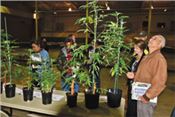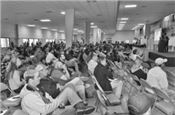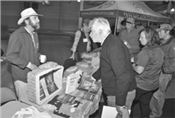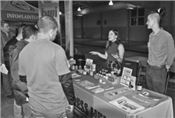|
Hemp Meeting Draws Crowd

Attendees at the LSU AgCenter industrial hemp informational meeting Nov. 13 held at the State Evacuation Center near
Alexandria get a firsthand look at hemp plants grown by LSU AgCenter plant breeder Gerald Myers.
Photo by Bruce Schultz/LSU AgCenter
ALEXANDRIA, LA.
About 500 people attended an LSU AgCenter meeting Nov. 13 to find out about the potential of growing industrial hemp as a cash crop.
Experts advised that the commodity can generate income, but they warned that it’s not without risk.
Hemp has several uses. It can be grown for CBD oil that has therapeutic applications for inflammation and anxiety. It is related to marijuana, but it does not have psychoactive characteristics.
The crop also can be grown for seed to be used as food for animal and human consumption. Hemp is also grown for fiber to make a wide variety of products, including rope and industrial products.
Bill Richardson, LSU vice president for agriculture, said the public has been seeking more information about hemp. “We’ve been getting thousands of questions for our county agents,” he said.
The AgCenter first anticipated the meeting would attract about 100 people, but more than 550 registered.
Rogers Leonard, AgCenter associate vice president for plant, soil and water resource programs, said the AgCenter hasn’t had time to evaluate the crop under Louisiana conditions and develop recommendations for growing the commodity. He said a Hemp Working Group has been formed with AgCenter experts for pest control, agronomics, economics and variety evaluation.
Also, a hemp website, http://bit.ly/32QLHCm, has been developed to provide preliminary information, he said.
The AgCenter has started research efforts that will be in full swing in 2020. “We intend to develop a fully integrated extension outreach program,” Leonard said
State Rep. Clay Schexnayder, of Ascension Parish, who wrote the successful bill this year to legalize hemp in Louisiana, said a similar measure died in the legislature in 2016. But it passed this year unanimously in the House and with only one opposing vote in the Senate.
“This bill is one of the biggest accomplishments the Legislature has done in the past 50 years for creating jobs,” he said.
The hemp business potential in Louisiana is significant. “I think the sky is the limit,” Schexnayder said.
Lester Cannon, of the Louisiana Department of Agriculture and Forestry, said the agency intends to develop regulations that will encourage hemp production. “We’re trying to get a solid regulatory foundation,” he said.
An LDAF license is needed to grow, transport or process hemp.
Sixteen businesses and organizations had information booths at the meeting at the State Evacuation Center near Alexandria, and they talked briefly about their products and services.
Michael Thompson, of Courier Labs in Houma, said the company plans to build a $20 million, 50,000-square-foot facility for processing hemp plants into finished CBD products.
Cypress Hemp owner Kristy Hebert, of Baton Rouge, said her company’s first crop was grown in Virginia this year, but its farm will move to Louisiana.
Allison Justice, who has been growing hemp in South Carolina since 2018, talked about the challenges of growing the crop. “The past two years in hemp for me and my family has felt like 12 years,” she said.
Seed or cuttings should be obtained from breeders who have grown a selected cultivar to test its properties, including the content of THC, the chemical compound that provides the high in marijuana. “You need to make smart cultivar selections,” she said.
Currently, hemp must be tested for its THC content, but the amount of THC in the cannabidiol, or CBD, is insufficient to induce a high. By federal law, hemp that exceeds .3 percent CBD in THC cannot be harvested and it must be destroyed.
Justice said her farm has experienced problems with insects and diseases. She has observed fire ants eating her crop, and diseases have claimed plants. “We do just accept some loss,” she said.
Wild pigs could be a problem, but so are humans. Justice said in the first year of growing the crop, law enforcement had to be called to prevent theft in the fields. “A lot of people went to jail,” she said.
Adequate plant breeding has not been done for South Carolina, she said, and varieties have yet to be purified with backcrossing to obtain uniformity in maturity dates.
Clones are much more expensive than seed, costing $4,500 more per acre.
Hemp has a good potential in Louisiana, Justice said. “I think it’s a great area for it.”
Louisiana’s long growing season is an asset, but the humidity could cause problems for drying the harvested plants.
AgCenter economist Mike Deliberto said the price for CBD oil and biomass dropped 42 percent this year.
He has devised charts of possible expenses and potential profits. “Price can change dramatically between planting and harvest,” he said.
The costs of CBD production can be as much as $13,000 to $14,000 an acre, with possible returns of $10,000 to $25,000 per acre, he said.
Despite higher production costs, large potential returns are enticing producers to grow the crop for CBD on small plots. Hemp for fiber presents the least risky enterprise and seems to offer the most sustainable option, Deliberto said.
But for all hemp production, a lack of enough processing facilities currently is a major barrier for the industry, he said.
Several people said they came to the meeting out of curiosity, while others were obtaining information with plans for growing hemp.
Robert Ganz, of Natchitoches, said he has idle family land once used for cattle grazing. “We have 250 acres that’s just doing nothing,” he said.
Ganz said he’s thinking of starting small and growing 60 acres.
Lewey Taylor, of Houma, said he has been considering hemp. “There are a lot of logistics to work out,” he said.
But he said he learned at the meeting that hemp probably won’t work for his area because it doesn’t do well in clay soils. It could possibly be grown on a smaller scale in a greenhouse.
Robert Dupont, of Dupont Nursery in Plaquemine, agreed that hemp prefers soil that drains well. “The only way to do it is to bring in soil,” he said.
A grower in Tennessee has been successful at growing smokable CBD flowers in a greenhouse. “He can’t produce enough of it,” Dupont said.
Scott Leonard, of Lafayette, came to the event out of curiosity. “I’m just trying to get more information about it,” he said.
Jessica Gonzalez, of Bush, said she and her husband have never farmed, but they are looking for something to grow on their land.
“We’re just looking at some farm application for our land,” Gonzalez said. “We’re just trying to figure out what to do with it. This meeting really is a great resource for someone just starting out.”
Farming partners Chris Temple and William Kassel, of Catahoula Parish, said they are looking for an alternative for their cotton, corn and soybean crops.
“Our profit margin is about zero,” Kassel said.
Temple said they will grow 12 acres of hemp next year for CBD oil and 200 acres for fiber. He said testing has shown their sandy soil should be good for hemp.
John Ford, of Lafayette, said he is looking at hemp to be grown in an indoor setting in vacant retail space in north Lafayette – a closed Walmart store that is in an Economic Opportunity Zone.
“I want to try to create some living-wage jobs,” Ford said. “We want to use it as a device to redevelop our community.”
Rice farmer Michael Hundley, of Acadia Parish, said he was looking at hemp as a possibility for his farm, but he had doubts because of his clay soil and Louisiana’s humidity.
“There’s a lot we’ve still got to learn. I sure wouldn’t get into it real big time,” Hundley said.
Four members of the 11 experts on the AgCenter Hemp Working Group were on the program.
AgCenter plant breeder Gerald Myers said he is currently evaluating 17 hemp varieties: one for fiber and 16 for CBD or dual-purpose. Seed quality is an important factor, and growers should have seed tested for germination.
“I’ve had some seed come in that’s less than 10 percent germination, and I’ve had some with 80 percent-plus germination,” Myers said.
AgCenter entomologist Jeff Davis said aphids, mites, fire ants and corn earworms are likely pests. “We’re going to have everything you can think of that will end up on it,” he said.
So far, Davis said, the only controls labeled for hemp are Section 25(b) products which are exempt from U.S. Environmental Protection Agency registration but must still be registered by LDAF.
AgCenter plant pathologist Raj Singh said hemp grown in Louisiana is potentially susceptible to blight, wilt, mold, nematodes and viruses, mostly because of the hot and humid conditions. Hemp will face numerous plant pathogens that are already present in Louisiana agriculture.
Singh said 10 pesticides have labels pending for hemp.
AgCenter weed scientist Ron Strahan said no herbicides are labeled to control weeds infesting hemp. Drift from herbicides such as 2,4-D, dicamba, glufosinate and glyphosate may lead to severe damage on hemp. ∆

LSU AgCenter plant pathologist Raj Singh, far left, talks about the insect and disease problems that hemp will face in Louisiana during an industrial hemp informational meeting Nov. 13. Singh is part of the LSU AgCenter Hemp Working Group along with, left to right, AgCenter entomologist Jeff Davis, AgCenter plant breeder Gerald Myers and AgCenter weed scientist Ron Strahan.
Photo by Bruce Schultz/LSU AgCenter

About 500 people attended the LSU AgCenter industrial hemp informational meeting Nov. 13 to learn about the crop’s potential in Louisiana.
Photo by Bruce Schultz/LSU AgCenter

Author and hemp grower Doug Fine, of Oregon, at left, is one of the vendors at the LSU AgCenter industrial hemp informational meeting Nov. 13. Sixteen vendors at the event talked about their products and services related to hemp.
Photo by Bruce Schultz/LSU AgCenter

Cypress Hemp owner Kristy Hebert, second from left, talks about her products at the LSU AgCenter industrial hemp informational meeting
Nov. 13 at the State Evacuation Center near Alexandria.
Photo by Bruce Schultz/LSU AgCenter
|
|